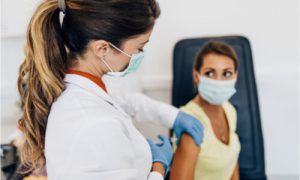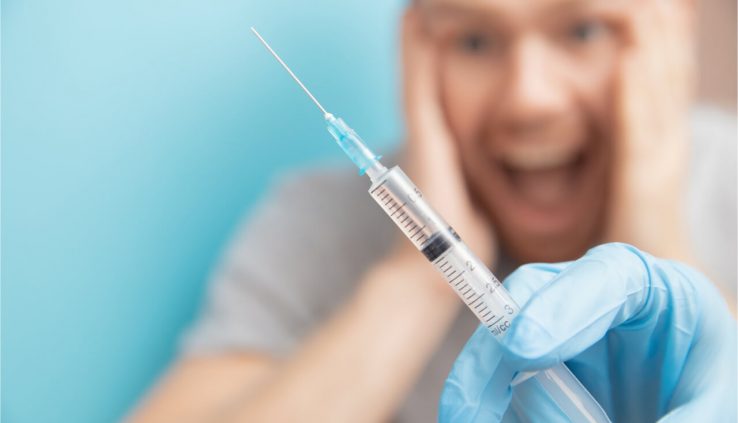Are you one of the people who have a great fear of needles? If so, you need to understand that you have to overcome this fear because it can affect the quality of your life. For instance, you might hesitate to get dental treatment because you know that the procedure may require injection. Because of that, you might have a hard time maintaining a healthy mouth and body by visiting your dentist regularly. While the level of fear and anxiety differs from one individual to another, this phobia needs to be addressed. Keep reading to learn the different treatments, including the causes, symptoms, and diagnosis for trypanophobia or the fear of needles.
What is Trypanophobia?
Trypanophobia is the term used to address a severe fear of medical procedures involving injections. Young children commonly have needle phobia since they are not used to the sensation of their skin being poked by something sharp.
Though most people who reach adulthood can tolerate needles much more quickly. For some, a fear of needles remains with them into adulthood, leading to a highly intense fear of needles.
Causes of Extreme Fear of Needles
Doctors are not sure why some individuals foster phobias, and others don’t. In any case, some factors that prompt the development of needle phobia include:
- changes in brain chemistry
- previous trauma or adverse life experiences caused by a particular object or situation

- a sensitive, inhibitive, or negative temperament
- a family member who had the phobia, which might be implying genetic or learned behavior
- childhood fears that have shown up by age 10
- learning about negative experiences or information
- medically-related fears such as dental fear or hypochondria
- anxiety disorder
- sensitivity to pain that causes high anxiety, heart rate, or blood pressure during a medical treatment involving a needle
- fainting or severe dizziness because of having a vasovagal reflex reaction when get injected by a needle
Symptoms
Being afraid of needles can create various symptoms that can significantly interfere with your quality of life. If you have a dental fear because of the needle, you can go to Leichhardt Market Dental’s website or your dentist’s office to see their other treatment options. Symptoms occur when needle-phobic patients see syringes or are informed they will undergo a procedure that includes needles. Common indications of needle phobia include:
- anxiety
- panic attacks
- heart palpitations or racing heart rate
- high blood pressure
- dizziness
- fainting
- insomnia
- feeling emotionally or physically violent
- avoiding or running away from medical treatment
How Does Being Afraid of Needles Affect You?
Trypanophobia can affect your life in various ways. These include:
Quality of Life
It is very troublesome to spend weeks fearing an upcoming medical appointment such as dental treatment. Know that other ways can help you overcome your dental work. In fact, you may consider getting a treatment that may help you get to sleep and relax during the procedure.
Health
Avoiding necessary medical procedures, such as blood tests, can lead to missed diagnoses, poorly checked medical conditions, and undertreatment.
Longevity
Skipping standard medical care can add to avoidable pain and death. For instance, a cancerous lump detected during the regular examination may go unnoticed until some other time, when it is no longer treatable.
Diagnosis
A doctor will do a physical examination to provide medical advice, diagnosis, and treatment. They will likewise pose inquiries about your symptoms, including information about the seriousness, duration, and nature of what you encounter.
For a doctor to diagnose a specific phobia such as trypanophobia, your signs and symptoms should:
- Lead to avoidance and outrageous distress
- Be unreasonable and extreme
- Be life-limiting and influence your capacity to function normally
- Occur promptly in response to the feared item
Moreover, your indications must be present for at least six months and not be because of another disorder or illness.
How To Treat Trypanophobia?
The objective of treatment for trypanophobia is to know the underlying reason for your phobia. Hence, the procedure may be different from one patient to another.
Most patients with fear of needles have suggested some sort of psychotherapy as their treatment. This could include:
Cognitive Behavioral Therapy (CBT)
Cognitive therapy includes exploring your apprehension about needles in therapy sessions and learning strategies to adapt to it. The therapist will assist you with learning various ways to think about your fears and how they influence you. Eventually, you should leave feeling a certainty or confidence over your feelings and thoughts.
Exposure Therapy
Exposure therapy is like CBT in that it concentrates on changing your physical and mental response to your fear of needles. The specialist will expose you to needles and the connected thoughts  they trigger. For instance, your therapist may initially show you pictures of a needle. Then after that, they may have you stand close to a syringe, hold a needle, and afterward, imagine getting an injection using a needle.
they trigger. For instance, your therapist may initially show you pictures of a needle. Then after that, they may have you stand close to a syringe, hold a needle, and afterward, imagine getting an injection using a needle.
Taking medication is essential when an individual is so anxious that they are unreceptive to the therapies. Anti-anxiety and sedative medications can calm your brain and body enough to diminish your symptoms. Prescriptions can likewise be utilized during a vaccination, blood test, or dental treatment if it helps to lessen your stress. You can go to this link here to know more about other treatment options to deal with your fear and anxiety.
Conclusion
Trypanophobia is a necessary condition that needs to be treated, as it could eventually lead you to neglect the medical care you need. So if you know someone, a friend or family member, that has this fear, take their issues seriously.
Remember that the key to dealing with a phobia is to address its underlying reasons. Once the doctor identifies what makes you afraid of needles, it is necessary to adhere to your treatment plan. With the appropriate treatment, it is possible to beat this potentially severe phobic condition.
References:
What Is Trypanophobia?
https://www.verywellmind.com/trypanophobia-2671700
What Is Exposure Therapy?
https://www.apa.org/ptsd-guideline/patients-and-families/exposure-therapy
What to expect during a physical exam.

